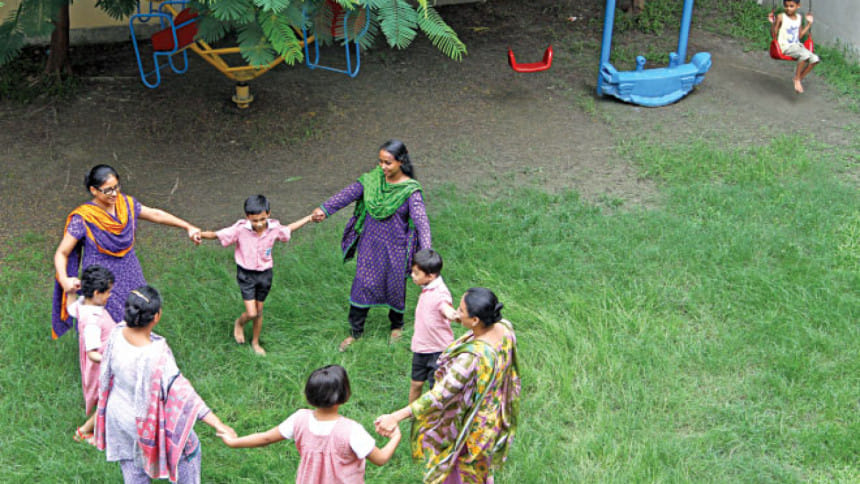Creating an autism-friendly society

"During the lockdown, our teachers offered online classes, but it was extremely challenging for autistic children to understand the instructions through a screen. Parents also struggled a lot. We tried to support parents by providing them with guidance on activities for children while staying in homes," remarked the executive director (ED) of an NGO in Dhaka that runs a school for children with special needs, including autism.
Since 2020, the disruption in learning due to pandemic-related school closures has reversed years of progress and exacerbated inequalities in education. Many students with autism have been disproportionately affected due to the disruption to routines and services as well as to the supports that they rely on, as explained by the ED. But the lives of people with autism are not easy even in regular times.
Autism, or autism spectrum disorder, refers to a broad range of conditions characterised by challenges with social skills, repetitive behaviours, speech and nonverbal communication. Each person with autism has a distinct set of strengths and challenges. While some autistic people can live independently, others have severe disabilities and require life-long care and support.
Like everyone else, autistic people have the right to the highest attainable standard of physical and mental health, education, employment, recreation, etc. But they and their families are often subjected to stigma and discrimination in accessing various services. "I was not even allowed to touch a newborn in the family, as my child is autistic. I was also blamed for the autism of my child," commented a mother.
In Bangladesh, having an autistic child is considered a misfortune for the family. It should not be so. A broad range of interventions can contribute to the development, health, well-being and quality of life of autistic people. Services are still limited in our country, which must be scaled up and whose quality should be improved. The monitoring of child development as part of routine child health care is critical in early diagnosis, which can lead to early evidence-based psychosocial interventions. Presently, child development centres in government medical colleges in Bangladesh can assess children's development. This should be expanded till primary level healthcare settings to improve diagnosis and referral.
Educating someone with autism requires an understanding of their needs, abilities and learning styles. In Bangladesh, most children with autism attend specialised schools. There are concerns about the quality of education offered in most of those schools. According to a study titled "Understanding the Education of Children with Autism in Bangladesh: Parents' Perspective", social and familial stigma, lack of transparency from administrators, and insufficiently qualified teachers are some of the challenges facing autistic students. The paper also recommends that technology be used more creatively in improving learning outcomes.
The objective of the disability-related Integrated Special Education Policy (2019) is to ensure that children with neurodevelopmental disabilities in Bangladesh receive appropriate education and life skills, and be prepared to integrate in mainstream schools. In addition, the policy also highlights the importance of regulating special schools. The Neuro-Developmental Disability Protection Trust (NDDP Trust) has been working for persons with neuro-developmental disabilities including autism since its establishment in 2013 by the government. The main objective of NDDP Trust is to promote the quality of life of the persons with NDDP and protect their rights. However, we must do more and be better in implementation of existing legal and policy commitments.
There should be more initiatives for capacity building of teachers in specialised schools for autistic children, and regular monitoring is required to ensure quality. With the required support, more children with autism (whose condition is not severe) could be integrated into the mainstream education system. Training of teachers is important. Autistic students could be paired with children without autism. This type of initiative has been quite effective in various countries for promoting inclusive education. Quality education is crucial so that they can achieve success in the labour market. In addition to improving access to education, parents and caregivers should be trained to support autistic people adequately at home. Collaboration between health, education, employment and social services is important.
Sometimes, autistic children are made to sing and dance in events, and some consider that as inclusion. But we must move beyond tokenistic participation and be more sincere in ensuring meaningful engagement of autistic people in society.
Teen climate activist Greta Thunberg said, "I have Asperger's syndrome and that means I'm sometimes a bit different from the norm. And given the right circumstances, being different is a superpower. It makes you think differently." An inclusive society needs all types of thinking to thrive. It is our responsibility to create the "right circumstances" where autistic people can realise their potential to the fullest and make meaningful contributions to society.
Laila Khondkar is an international development worker.

 For all latest news, follow The Daily Star's Google News channel.
For all latest news, follow The Daily Star's Google News channel. 



Comments